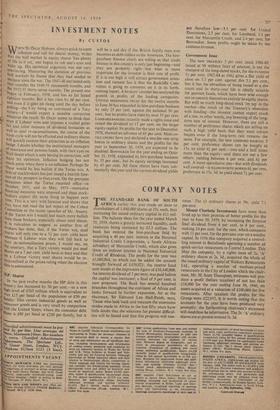INVESTMENT NOTES
By CUSTOS
Nv.FirN Sir Oscar Hobson. always quick to scent inflation and call for dearer money, writes that the bull market in equity shares 'has plenty 01 life in it yet,' one begins to rub one's eyes and Wake up. His statistical argument was not very convincing. Measuring the duration of previous !nill markets he found that they had tended to increase since the war. The 1947-48 one lasted only four months; the 1949-51 nineteenth months, and the 1952-55 thirty-seven months. The present one began in February, 1958, and has so far lasted eighteen months. But it has risen by 60 per cent. and even• if it goes on rising until the day before Polling—the City being so convinced of a Tory victory--1 would expect a sizeable correction Whatever the result. Sir Oscar seems to think that even if Labour wins and imposes a capital gains tax and some measure of dividend limitation as well as steel re-nationalisation, the course of the trade cycle will not be affected and ordinary shares u'ill quickly recover their attraction as an inflation hedge. I doubt whether the institutional managers Of insurance and pension funds, with their eyes on Wall Street which is now having its correction, will share his optimism. Inflation hedging has not much point when there is no inflation. Perhaps Sir Oscar would be less bullish if the Tories win. A firm of stockbrokers has just issued a bearish fore- cast of the prospect in that event. On the previous occasions when the Tories resumed office—in October. 1951, and in May, 1955restrictive financial measures were imposed and these stock- brokers expect the same thing to happen next time. This is a very wild forecast and shows that they have not read the last report of the Cohen ( ommittee or the recent speeches of Mr. Amory. If the Tories win I would feel much more bullish than these brokers, .especially about steel shares. It is ridiculous to suggest, as another firm of brokers has clone. that, if the Tories win, steel Shares will only rise to a 51 per cent. yield basis Whereas if Labour wins they will fall back to their de-nationalisation prices, 1 would say, on the contrary, that a Tory victory would put steel Shares on a 5 per cent. yield basis at least and that on a Labour victory steel shares would be re- nationalised at the prices ruling when the election date is announced.
IltP. Shares In the past twelve months the HP debt in this country has increased by 50 per cent.—to a new high level of £763 million which is equivalent to over £15 per head of the population or £50 per tinnily. This covers industrial goods as well as consumer goods and is very small by comparison With the United States, where the consumer debt alone is £80 per head or £250 per family, but it will be a sad day if the British family man ever becomes as debt-ridden as the American. The hire- purchase finance chiefs are telling us that credit finance in this country is only just beginning—and they are probably right—but what is more important for the investor is their rate of profit. If it is too high it will attract government atten- tion and rumour has it that the Radcliffe Com- mittee is going to comment on it in its forth- coming report. A brokers' circular has analysed the growth in profits of the leading companies. UNITED DOMINIONS TRUST for the twelve months to June 30 has expanded its hire-purchase business by only 25 per cent. against the national 50 per cent., but its profits have risen by over 55 per cent. LOMBARD BANKING recently made a rights issue and raised the dividend to 17 per cent. on the larger equity capital. Its profits for the year to December, 1958, showed an advance of 65 per cent. MERCAN- TILE CREDIT have just declared a one-for-one scrip bonus in ordinary shares and the profits for the year to September 30, 1959, are expected to be doubled. BOWMAKER for the year ending on Octo- ber 31, 1958, expanded its hire-purchase business by 35 per cent., but its equity earnings increased by 45 per cent. All these shares have risen sub- stantially this year and the current dividend yields are therefore Tow-9.1 per cent. for United Dominions, 2.7 per dent. for Lombard, 3.3 per cent. for Mercantile Credit, and 2.4 per cent, for Bowmaker. Some profits might be taken by the cautious investor.
Government Issue
The new TREASURY 5 per cent, stock 1986-89, issued at 98 without limit of amount, is not the cheapest of the long-dated stocks, for the FUNDING 5f per cent. 1982-84 at 104k gives a flat yield of close on 5.3 per cent. against this 5.1 per cent., but it has the attraction of being issued at a dis- count and its thirty-year life is ideally suitable for pension funds, which have been wise enough not to commit themselves entirely to equity shares. But with so much long-dated stock `on tap' in the market—the result of the Treasury's obsession with funding—the investor cannot expect much of a rise, in other words, any lowering of the long- term rate of interest. However, there are still a number of preference shares which are selling on such a high yield basis that they must attract buyers even if the long-term rate remains the same. For example, the new LOMBARD BANKING 5 per cent, preference shares can be bought at 15s. to yield 61 per cent.—two and a half times more than the equity—and there are not a few others yielding between 6 per cent, and 64 per cent. A more speculative one—but with dividends well covered—is ittiNowoRnt MORRIS 6-1- per cent. preference at 17s. 3d. to yield about 71 per cent.


































 Previous page
Previous page